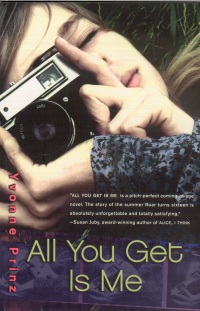| ________________
CM . . .
. Volume XVII Number 28 . . .March 25, 2011 
 |
All You Get Is Me.
Yvonne Prinz.
Toronto, ON: HarperCollins, 2011.
280 pp., pbk., $14.99.
ISBN 978-1-55468-514-1.
Grades 7-12 / Ages 12-17.
Review by Beth Wilcox.
***½ /4
|
| |
|

excerpt:
My darkroom is an old supply shed, with blankets nailed over the windows, that my dad converted for me to fulfill a contractual agreement we arrived at on the day we left the Noe Valley house for good. He told me that if I let go of the banister and got in the car, he would build me a darkroom on the farm. Of course I needed that in writing. Parents are often full of empty promises when they want to motivate you and I needed a completion date for this alleged darkroom. I am, after all, the daughter of a lawyer. Before I got in the car I went up and down the street and delivered an index card with our new address and phone number to each of our neighbors just in case my mom came looking for us. They all looked at me like I was a sad orphan, which made me feel slightly better about the fact that I was getting away from this place where everyone knew at least part of my story.
Yvonne Prinz's latest YA novel, All You Get Is Me, is a captivating coming of age story that will find broad appeal among female adolescents. Having grown up in San Francisco, Roar (Aurora) is still somewhat bewildered to find herself living on an organic farm after her father's sudden decision to leave his job as a human rights lawyer two years earlier. The novel spans the summer before Roar's sixteenth birthday, as she experiences her first romantic relationship and begins to develop her sense of autonomy.
What makes All You Get Is Me unique is the way Prinz weaves social justice issues into the typical middle-class coming of age story. Unlike the average adolescent, Roar is compelled to confront the inequalities in her society after she witnesses a shocking vehicle collision that kills a young mother who was an illegal Mexican immigrant. Roar's father decides to lead the campaign for justice on behalf of the dead woman's family, leaving Roar to wonder if he is ignoring the feelings of the deceased's family in order to adopt the tragedy as his pet cause. Prinz's exploration of the relationship between undocumented farm labourers and the American landowners adds texture to the novel as Roar quickly begins to refer to the dead woman as if they were friends but remains blind to her own hypocrisy and her role in reinforcing the social hierarchy. Although immigration policy and illegal workers' rights are politically charged topics in the United States, Prinz's heroine speaks against the culture that dehumanizes undocumented Hispanic labourers in a manner that refrains from being didactic.
In addition to its complex themes, Prinz's novel is memorable because of her well-developed cast of quirky characters. A great deal of the emotional richness of the novel comes from Roar's maturing relationships with her oddball parents. In addition to rebuilding her relationship with her lawyer-cum-organic-farmer father, Roar struggles to understand her mother's absence. Roar's mother abandoned the family two years earlier, and Roar continues to pick at the emotional scars. Nonetheless, Roar's mother has a positive lasting influence on her daughter as it was she who introduced Roar to the romance of manual photography, which Roar uses as a literal and metaphorical lens to explore her world and express herself. When Roar finally locates her mother, the results are authentically bittersweet.
Although Roar only turns 16-years-old at the end of the novel, she is a complex and believably mature young woman, and her story will appeal to readers both older and younger than the heroine.
Highly Recommended.
Beth Wilcox, a graduate from the Master of Arts in Children's Literature program at the University of British Columbia, is currently enrolled at the Queen's University Faculty of Education.

To comment
on this title or this review, send mail to cm@umanitoba.ca.
Copyright © the Manitoba Library Association. Reproduction for personal
use is permitted only if this copyright notice is maintained. Any
other reproduction is prohibited without permission.
NEXT REVIEW |
TABLE OF CONTENTS FOR THIS ISSUE
- March 25, 2011.
AUTHORS |
TITLES |
MEDIA REVIEWS |
PROFILES |
BACK ISSUES |
SEARCH |
CMARCHIVE |
HOME |
